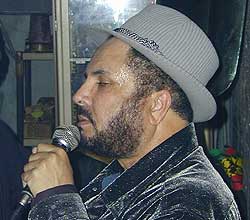Dennis Alcapone

Real Name: Dennis Smith
Born: August 6th, 1947
Place of Birth: Clarendon, Jamaica
Official website: not known
Initially inspired by U-Roy, Alcapone began DJing for El Paso Hi-Fi in 1969. He was the first DJ to enjoy success on record after U-Roy, and likewise the first to challenge his dominance. His initial records were made for youth producer and sometime ghetto dentist Keith Hudson, with titles including "Shades Of Hudson" (1970), "Spanish Omega" (1970), "Revelation Version" (1970), "Maca Version" (1970) and "The Sky's The Limit" (1970). From 1970 to 1972 Alcapone had big hits with Duke Reid, toasting his witty, half-sung, half-spoken lyrics over classic Treasure Isle rhythms and coasting to the top of the Jamaican chart with regularity. Tunes such as "Number One Station" (1971), "Mosquito One" (1971), "Rock To The Beat" (1972), "Love Is Not A Gamble" (1972), "Wake Up Jamaica" (1972), "The Great Woggie" (1972), "Teach The Children" (1972) and "Musical Alphabet" (1972), all of which were recorded at Treasure Isle, and "Ripe Cherry" (1971) and "Guns Don't Argue" (1971) for producer Bunny Lee, put Alcapone in the front rank of Jamaican DJs.
In the period from 1970 until he left for the UK in 1973, Alcapone's services were continually in demand. He made over 100 singles in this time and released three albums, in the process working with such producers as Coxsone Dodd, Lee Perry, Sir JJ, Winston Riley, Joe Gibbs, Prince Buster, Randy's and others.
He toured Guyana in 1970 and the UK in 1972 and 1973, after having won the cup presented to the best DJ by Swing magazine in Jamaica. He also began production work, issuing music by himself, Dennis Brown, Augustus Pablo and Delroy Wilson. Since the mid-70s he has been less active, but still found time to record albums for Sidney Crooks, Bunny Lee and Count Shelly. In the late 80s he returned to live performance, appearing at the WOMAD festival in Cornwall and Helsinki in 1989. In 1990 he made more club appearances in the UK. Later in the year he returned to Jamaica for three months and recorded over digital rhythms for Bunny Lee. Alcapone remains the classic Jamaican toaster, on his best form capable of transforming and adding to any song he DJs, in the great toasting tradition pioneered in Jamaican dancehalls.
Encyclopedia of Popular Music
Copyright Muze UK Ltd. 1989 - 2002
Source - BBC Music Profiles
